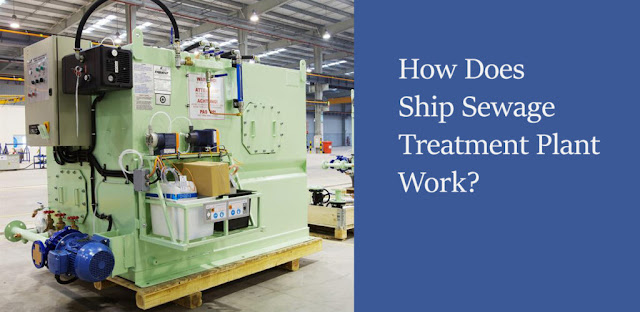How does Ship Sewage Treatment Plant work?
Before going anywhere else, the first and foremost question one would ask is, “what is the reason to use ship sewage treatment plant if the waste is biodegradable”. The question is definitely obvious and worth it but the problem is that it is not necessary that all sewage elements are biodegradable and not all consume the same time to break them down. Also, untreated sewage also has solid particles that take a lot of time to break up. This is the reason why the usage is essential for the sewage treatment plant on ships.
Raw sewage in the water requires oxygen to break down it naturally and this sewage absorbs excessive oxygen when disposed to the sea and hence, lessen the essential amount of oxygen that is required by the marine and fishes plants. Bacteria that are present in the sewage actually produce hydrogen sulfide gas that generates an acrid smell. The human waste has E. Coil bacteria found in the intestine. The amount of E. Coil bacteria in a water model notifies the sewage content of that sample.
There are two types of Sewage Treatment plants on Ships
1. The biological sewage treatment plant
2. The chemical sewage treatment plant
We will discuss both of them one by one so that you can come to know the entire working procedure of STP on Ships
1. Chemical Sewage Treatment Plant
A chemical treatment plant usually consists of a huge storage tank that collects, then treats and stores the sewage for discharging it to the sea or for a shore receiving facility. Sewage is firstly gathered in a tank and the liquid content is reduced. It can be conducted by flushing water from the bathroom and washbasins sewer directly into the sea. Any other sources of liquid are treated chemically to overcome the smell and color and after that, it is reused as flushing water in the toilets. The chemicals used help in the procedure of breaking the solid particles and also in the sterilization.
A mechanical instrument called comminutor is extensively used to help to break down the solid particles to the smaller ones. The liquid sewage remains at the top and the solid particles actually settle down that is after that, discharged to a sullage tank. The liquid sewage is treated chemically and is utilized for toilet flushing purposes. The sullage tank of the sewage is discharged to the shore gathering facilities.
Well, it is very essential to supply an adequate quantity of chemical dosages to prevent corrosion and odor because of the high level of alkalinity.
2. Biological Sewage Treatment Plant
Biological Sewage Treatment Plant actually uses bacteria to make the process of breaking solid constituents easily. It helps to generate an oxygen-rich atmosphere that an aerobic bacterium uses to multiply and fall apart the sewage waste to adapt it into the sludge. The treated sewage after that generated can be disposed off to any water and the procedure which takes place under the plant is called the aeration procedure.
The entire plant is separated into three compartments named,
• Settling compartment
• Aeration compartment
• Chlorine treatment compartment
Sewage enters the sewage treatment plant first via the aeration compartment. The aerobic bacteria usually absorb the sewage waste and lessen it to small particles. A continuous supply of atmospheric oxygen is offered to enhance the rate of the digestion procedure. The disintegrated solid water is after that adapted to the settling section where the solid constituents settle down under the gravity effect. The liquid that presents at the top is passed to the chlorine treatment section. In this section, the liquid water is treated with chlorine as well as other chemicals for killing any bacteria that is alive. When all set, the water is after that discharged into the sea and the chlorination process is assisted with the use of chlorine tablets. The settled sludge in the settling compartment is stored and removed in a storage tank to further discharge it to shore facilities or the decontrolled areas. This is the exact working procedure and types of the Sewage treatment plant in India and you can know more just by getting in touch with the Clear ion experts.




Comments
Post a Comment